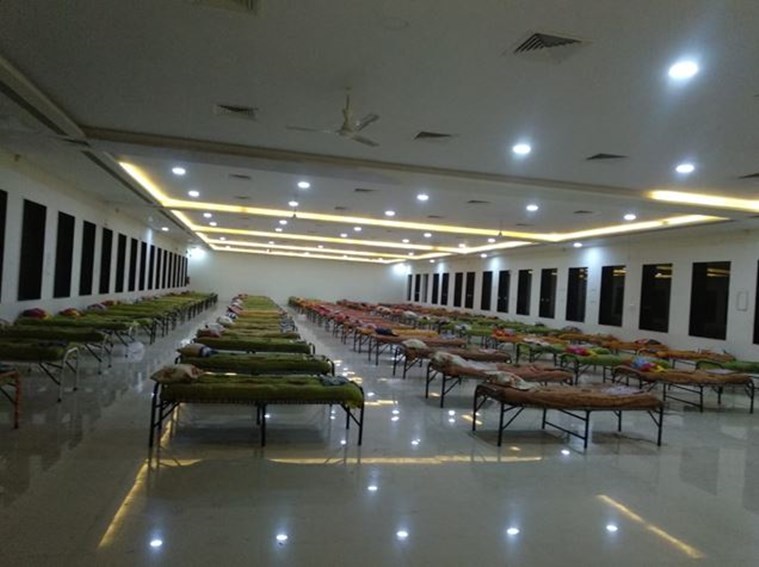Mumbai: In civic ward with second-highest COVID-19 cases, containment protocol an uphill task
In Kalapani, a cluttered chawl in Nagpada, a neighbour says no health worker came to ask if they have any symptoms. The ward has the second-highest number of COVID-19 cases in the city, and poor contact tracing and low awareness have hampered the fight against the virus.
 The chawl where the 46-year-old passed away in Nagpada. (Express photo/Tabassum Barnagarwala)
The chawl where the 46-year-old passed away in Nagpada. (Express photo/Tabassum Barnagarwala)
In Kalapani, soon after a 46-year-old chronic lung disease patient died of coronavirus disease on April 3, her family of six was whisked away to a quarantine ward in Jogeshwari Trauma hospital.
“Honestly, we don’t understand what is happening. Nobody has time to explain to us for how long we will be kept here,” her daughter says. Sample of the deceased woman’s husband was taken on April 4, but nine days since, the test result is still awaited at the hospital.
Back in Kalapani, a cluttered chawl in Nagpada, a neighbour says no health worker came to ask if they have any symptoms. The ward has the second-highest number of COVID-19 cases in the city, and poor contact tracing and low awareness have hampered the fight against the virus.
E ward, comprising Byculla, Nagpada, and parts of Agripada, has 111 COVID-19 positive cases, second only to G-South ward in which Worli Koliwada has become a hotspot. The ward has already seen a transfer of two assistant commissioners in last one week. Even as police patrols parallel lanes in the neighbourhood, people in this lane, where the woman died, continue to gather and sit outside their homes to chat over tea in the evenings.
“We don’t understand what this coronavirus is. If we need vegetables, we have to step out,” says the brother-in-law of the deceased woman. He lives in the chawl opposite her house. He claims that civic health workers took his father, brother and nephews to the hospital after his sister-in-law passed away at Nair hospital on April 3. “The chawl was disinfected, but that’s it. No civic worker returned since,” he says. Three of the six tested positive, result of one is awaited.
“Delay in contact tracing is a problem. The E ward is so densely populated, a person may come across 80 people in a few days, but not even 10 contacts were quarantined and tested. That led to the spread,” says corporator Rais Shaikh, who first raised the red flag on April 5 when there were just 19 cases in the ward. He cites the example of a building in Agripada, where a person tested positive and no contact tracing was undertaken. “Buildings were not sealed, people moved around freely,” Shaikh says.
 Beds have been set up in Richardson and Cruddas as coronavirus care facility. (Express photo)
Beds have been set up in Richardson and Cruddas as coronavirus care facility. (Express photo)
A delay was also noticed in handling Wockhardt hospital, where 56 staffers have tested positive for coronavirus after a heart patient was admitted on March 17. The hospital has the highest number of COVID-19 infected staffers in the city.
A civic official from another ward says the E ward officers were not swift enough in directing the hospital to quarantine and test all staffers. Apart from the delay in contact tracing in densely populated chawls, a major part of the population at the ward belongs to the lower socio-economic strata, where awareness about the virus remains low.
“People are not taking the lockdown seriously in these pockets,” says Additional Municipal Commissioner Suresh Kakani, adding that BMC took help from political leaders to counsel people.
Similar issues have mushroomed in Worli Koliwada and Dharavi. “Another problem is that several people live in a small room in these areas and social distancing is not possible to maintain. Therefore, we decided to shift high-risk contacts to coronavirus care centres,” Kakani says. Over 1,000 people have been shifted from these containment zones to hotels, guest houses, lodges, schools and hotels. Kakani says the civic body has become more aggressive in its approach.
Shanu Shaikh, a local, says for a strict lockdown, the government also needs to first provide ration supply to locals. “We cannot stay at home hungry.”
Civic officers, however, claim that the containment protocol is slowly getting streamlined in the ward. Prashant Gaikwad, who has taken additional charge of E ward, says in the last two days he has appointed 19 containment zone officers, each officer for one such zone, to ensure smooth supply of groceries and vegetables in containment areas. “We have set up 200 beds in Richardson and Cruddas as a coronavirus care centre for chawl-dwellers who share common toilets in areas where COVID-19 cases have been detected. These low-risk contacts will be shifted there,” Gaikwad said.
On Saturday, he visited three of these hotspots in the ward to counsel people about coronavirus infection.







